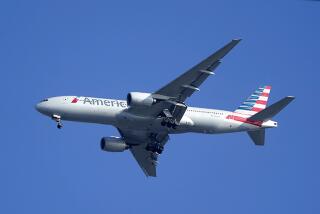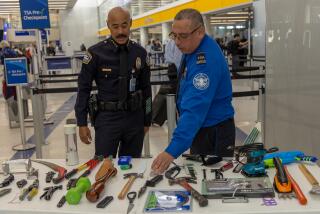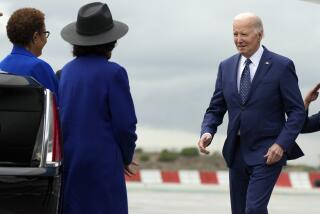Airlines Must Step Up Checks on Electronic Items
- Share via
WASHINGTON — Transportation Secretary Samuel K. Skinner, still seeking to bolster aviation security in the aftermath of the December Pan American Flight 103 bombing over Scotland, Thursday ordered U.S. air carriers to intensify their efforts to screen radios, tape players and computers carried aboard planes in Europe and the Middle East.
But Skinner rejected a plan that could have banned such electronic devices from passenger compartments altogether, saying that such a move would unnecessarily inconvenience millions of business and pleasure travelers.
In deciding not to “penalize” such passengers, Skinner warned that overreaction to the threat of terrorism would “only further the terrorists’ objective of disrupting the world’s air transportation system.”
The new regulation, issued nearly six months after a bomb concealed in a radio-tape recorder exploded in the baggage hold of Flight 103, killing 270 people, marks the Administration’s first formal response since the disaster to the security problems posed by electronic devices.
Skinner acknowledged, however, that the plan goes no further than those already adopted by many U.S. airlines. For that reason, he said, officials expect that the new measures will not cause any additional passenger delays.
“The option we have selected provides the proper balance between passenger safety and convenience at this time,” Skinner said.
Under the mandatory plan, which is to become effective immediately, airline security agents are to carefully examine all radios, tape players and laptop computers that passengers seek to check or carry on board U.S. carriers at high-risk airports abroad.
The machines are to be examined, tested to ensure that they work properly and in some cases even dismantled so they can be searched more carefully, Skinner said in a speech before the Air Freight Assn. in suburban Virginia.
The purpose, Skinner said, would be to “ensure that the devices will not become hiding places for explosives or bombs like the one that destroyed Pan Am 103.”
Law enforcement officials have not yet identified those responsible for the Dec. 21 bombing, but they have concluded that the explosive device was hidden in a Toshiba radio-tape recorder in a suitcase in the airplane’s hold.
The new regulations are the latest in a series of actions that Skinner has ordered to improve aviation security since the Pan Am bombing. Airlines already have been required to X-ray all checked baggage, and the FAA has accelerated its development of equipment that can seek out even hard-to-detect plastic explosives.
Exempted from the new regulations will be flights operating within the United States or departing from this country to foreign destinations. Transportation Department officials said that the terrorism threat within the United States appears to be too insignificant to justify such stringent measures.
More to Read
Sign up for Essential California
The most important California stories and recommendations in your inbox every morning.
You may occasionally receive promotional content from the Los Angeles Times.










